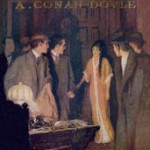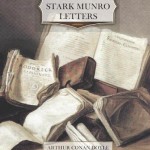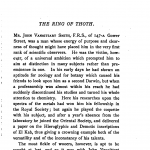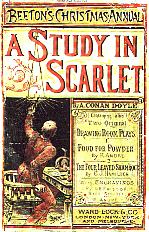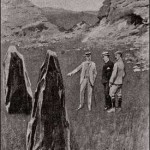My particular friend, Ward Mortimer, was one of the best men of his day at everything connected with Oriental archaeology. He had written largely upon the subject, he had lived two years in a tomb at Thebes, while he excavated in the Valley of the Kings, and finally he had created a considerable sensation by his exhumation of the alleged mummy of Cleopatra in the inner room of the Temple of Horus, at Philae. With such a record at the age of thirty-one, it was felt that a considerable career lay before him, and no one was surprised when he was elected to the curatorship of the Belmore Street Museum, which carries with it the lectureship at the Oriental College, and an income which has sunk with the fall in land, but which still remains at that ideal sum which is large enough to encourage an investigator, but not so large as to enervate him.
There was only one reason which made Ward Mortimer’s position a little difficult at the Belmore Street Museum, and that was the extreme eminence of the man whom he had to succeed. Professor Andreas was a profound scholar and a man of European reputation. His lectures were frequented by students from every part of the world, and his admirable management of the collection intrusted to his care was a commonplace in all learned societies. There was, therefore, considerable surprise when, at the age of fifty-five, he suddenly resigned his position and retired from those duties which had been both his livelihood and his pleasure. He and his daughter left the comfortable suite of rooms which had formed his official residence in connection with the museum, and my friend, Mortimer, who was a bachelor, took up his quarters there.
On hearing of Mortimer’s appointment Professor Andreas had written him a very kindly and flattering congratulatory letter. I was actually present at their first meeting, and I went with Mortimer round the museum when the Professor showed us the admirable collection which he had cherished so long. The Professor’s beautiful daughter and a young man, Captain Wilson, who was, as I understood, soon to be her husband, accompanied us in our inspection. There were fifteen rooms, but the Babylonian, the Syrian, and the central hall, which contained the Jewish and Egyptian collection, were the finest of all. Professor Andreas was a quiet, dry, elderly man, with a clean-shaven face and an impassive manner, but his dark eyes sparkled and his features quickened into enthusiastic life as he pointed out to us the rarity and the beauty of some of his specimens. His hand lingered so fondly over them, that one could read his pride in them and the grief in his heart now that they were passing from his care into that of another.
He had shown us in turn his mummies, his papyri, his rare scarabs, his inscriptions, his Jewish relics, and his duplication of the famous seven-branched candlestick of the Temple, which was brought to Rome by Titus, and which is supposed by some to be lying at this instant in the bed of the Tiber. Then he approached a case which stood in the very centre of the hall, and he looked down through the glass with reverence in his attitude and manner.
“This is no novelty to an expert like yourself, Mr. Mortimer,” said he; “but I daresay that your friend, Mr. Jackson, will be interested to see it.”
Leaning over the case I saw an object, some five inches square, which consisted of twelve precious stones in a framework of gold, with golden hooks at two of the corners. The stones were all varying in sort and colour, but they were of the same size. Their shapes, arrangement, and gradation of tint made me think of a box of water-colour paints. Each stone had some hieroglyphic scratched upon its surface.
“You have heard, Mr. Jackson, of the urim and thummim?”
I had heard the term, but my idea of its meaning was exceedingly vague.
“The urim and thummim was a name given to the jewelled plate which lay upon the breast of the high priest of the Jews. They had a very special feeling of reverence for it—something of the feeling which an ancient Roman might have for the Sibylline books in the Capitol. There are, as you see, twelve magnificent stones, inscribed with mystical characters. Counting from the left-hand top corner, the stones are carnelian, peridot, emerald, ruby, lapis lazuli, onyx, sapphire, agate, amethyst, topaz, beryl, and jasper.”
I was amazed at the variety and beauty of the stones.
“Has the breastplate any particular history?” I asked.
“It is of great age and of immense value,” said Professor Andreas. “Without being able to make an absolute assertion, we have many reasons to think that it is possible that it may be the original urim and thummim of Solomon’s Temple. There is certainly nothing so fine in any collection in Europe. My friend, Captain Wilson, here, is a practical authority upon precious stones, and he would tell you how pure these are.”
Captain Wilson, a man with a dark, hard, incisive face, was standing beside his fiancee at the other side of the case.
“Yes,” said he, curtly, “I have never seen finer stones.”
“And the gold-work is also worthy of attention. The ancients excelled in——”—he was apparently about to indicate the setting of the stones, when Captain Wilson interrupted him.
“You will see a finer example of their gold-work in this candlestick,” said he, turning to another table, and we all joined him in his admiration of its embossed stem and delicately ornamented branches. Altogether it was an interesting and a novel experience to have objects of such rarity explained by so great an expert; and when, finally, Professor Andreas finished our inspection by formally handing over the precious collection to the care of my friend, I could not help pitying him and envying his successor whose life was to pass in so pleasant a duty. Within a week, Ward Mortimer was duly installed in his new set of rooms, and had become the autocrat of the Belmore Street Museum.
About a fortnight afterwards my friend gave a small dinner to half a dozen bachelor friends to celebrate his promotion. When his guests were departing he pulled my sleeve and signalled to me that he wished me to remain.
“You have only a few hundred yards to go,” said he—I was living in chambers in the Albany. “You may as well stay and have a quiet cigar with me. I very much want your advice.”

